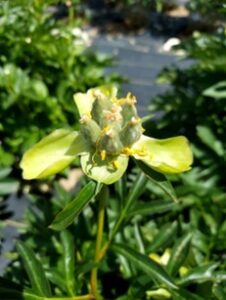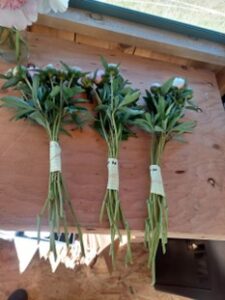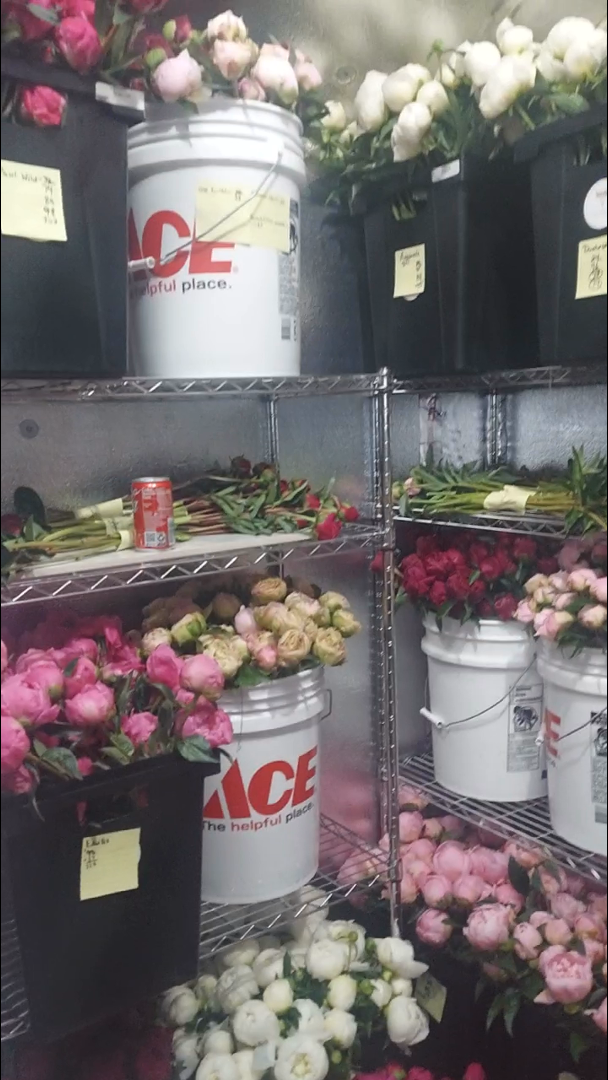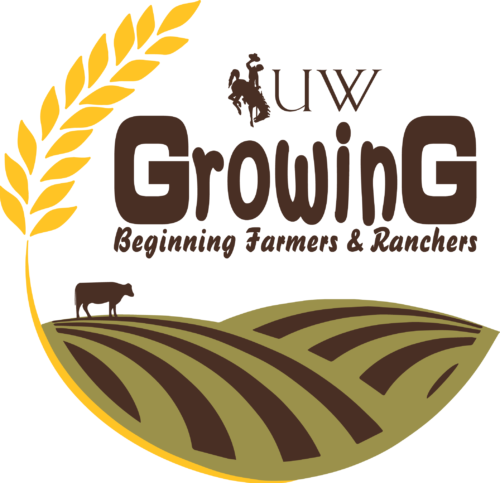Slowing Down
#bfrdpwy #aginternship #RightRisk
We are nearing the end of bloom season, which is both a relief and also sad. By the end of the week, there were only a few good-quality buds to cut. At this point, we are focusing on small cuts, or shorter, smaller blooms that aren’t good enough to sell wholesale or in the farm share, but are useable for small table bouquets that go to the coffee shops my host markets to. We are also deadheading any spent plants, as we don’t want the plants using energy to create seeds. This takes energy away from energy distributed to the roots which would lead to a healthier, more vigorous plant next season. We also did a lot of dry-storing, which is a method of storing peonies without water. Instead of recutting the stems and placing them in water, we bundle them in bunches of 10, label the variety with a sticky note, and place them horizontally in the cooler. Buds can last up to a month using this method, and when recut and placed in water, are just as good and beautiful as before they were cut.

Some of the struggles we faced this week were finding room to place new buckets in the cooler, and even running out of buckets! Because this season was such a quick, hot one, the struggle we are facing is holding the blooms until the last farm share date (Peony Posse, as my host calls it), which is the first week of July. Two weeks is a long time to store peonies, especially if you want the blooms to last a long time in the vase. Hopefully, keeping the cooler at a crisp 33 degrees Fahrenheit and prayers will keep the blooms fresh.
This week I got to visit with one of my host’s good friends from Lander. She is a flower farmer and florist and works out of her backyard. She freelances for weddings and makes bouquet buckets for do-it-yourself brides who prefer to make their arrangements themselves. The reason for the visit was so she could catch up with my host and talk about possibly doing an education event with her in the future by helping with a wedding. However, I found this conversation also educational. I learned more ways I could make a living off of flower farming and floristry. I also learned some applicable steps on how to move toward my goals. They suggested finding a florist or farmer whose work I love after graduating and working for them. That way, I build experience, have a consistent income, and possibly make future contacts. While I am working, I can start small, growing cut flowers in my backyard and figuring out the best ways to market them to the local clientele. This was helpful because the idea of starting a flower farm from scratch is intimidating to me sometimes. This conversation encouraged me and gave me simple steps on how to move forward with my goals.

One thing I learned this week that was challenging was networking. I have talked about networking briefly before, and frankly, find it intimidating. My host suggested sending a thank you card to people I meet at conferences and workshops who I am inspired by and want to learn from. She says to include your intention of wanting to keep in contact with them in the future. I found this idea wildly uncomfortable. My host pointed out that this is a generational thing. For older generations, this direct communication is polite, necessary, and normal for creating good business contacts. To me, this seems forward and intrusive. However, I know networking is not something that happens passively. Building good, helpful relationships in your profession does not happen overnight. It takes some boldness and forethought on my part to intentionally make such contacts. So, this is something that requires a perspective change on my part.

Another thing I noticed was the difficulty in maintaining a work-life balance that my host and her friend seemed to experience. This is not specific to them; this seems to be a trend in everyone involved in agriculture. Flower farming might seem like a low-stress and flowery (pun intended) occupation, but it comes with unique struggles. Flowers have an expiration date. It is difficult to plan for the weather and how the plants will respond, which has been observed with the peonies blooming in two weeks this year due to higher-than-normal temperatures. There is stress associated with putting out a high-quality product and having enough of said product. Most small flower farms work independently (my host commonly refers to herself as a one-woman show), which is amazing, but puts a lot of stress on yourself. The bottom line is this can create a lot of worry and stress about things out of our control. How do you manage that constant worry and stress in this profession? How do you know when to take a break from a job that requires so much time, energy, and passion? I don’t know if anyone has a good solution to this. And perhaps that’s a good thing that agriculture is a profession with so much passion and emotion.
Submitted by: Emzie Coop
Edits by: GrowinG Internship Team

